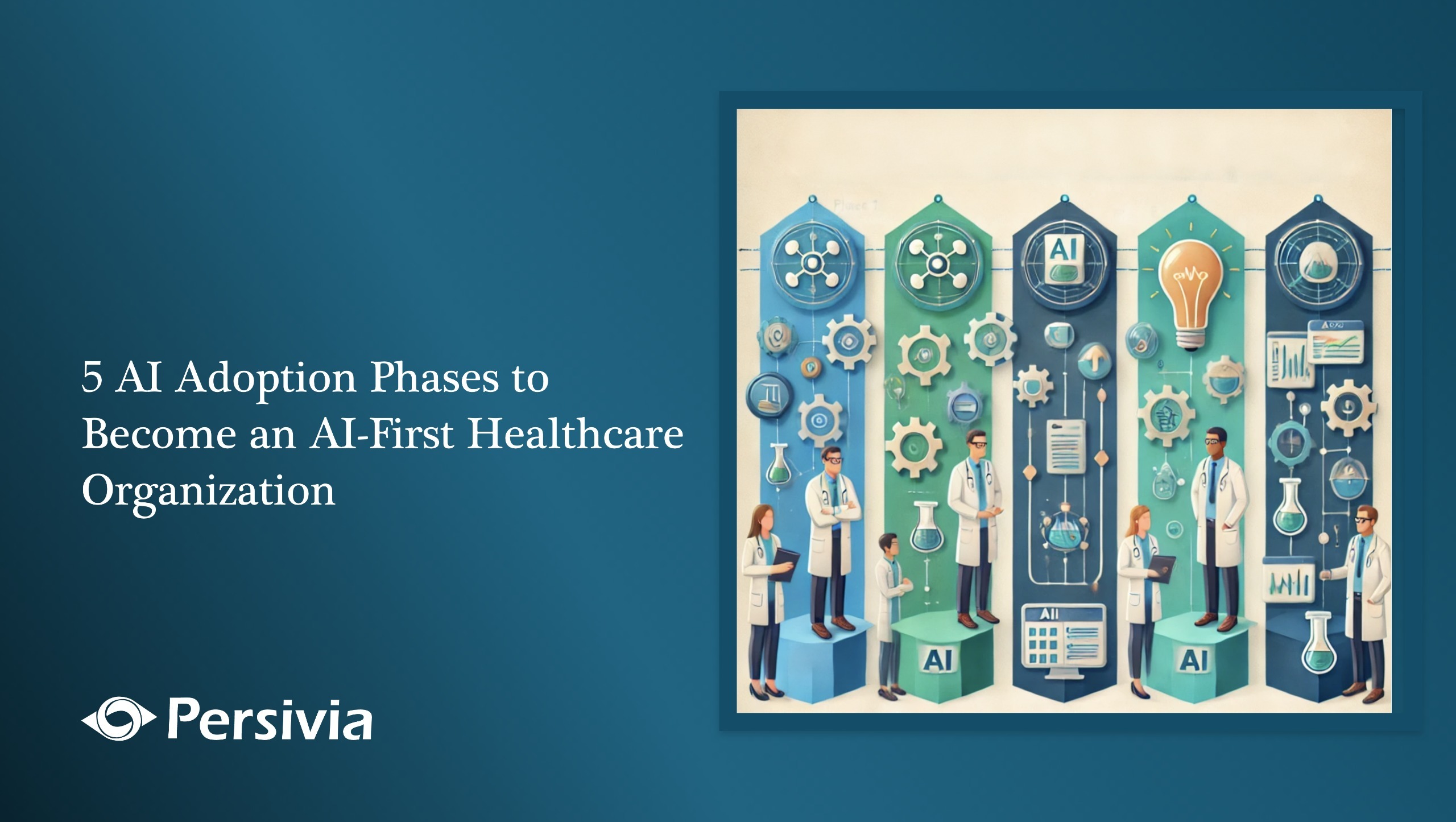As artificial intelligence AI increasingly integrates into the healthcare systems, grasping the stages of AI adoption and mastering their navigation becomes pivotal for successful integration. AI holds the potential to streamline processes, facilitating rapid and precise decision-making, ultimately enhancing efficiency and improving the quality of care and cost-effectiveness. However, before tapping into these benefits, healthcare entities must comprehend the stages of AI adoption. From initial awareness to the implementation of deep learning technologies, this article offers insights into the stages of AI adoption tailored to the healthcare sector, along with practical guidance for navigating through each phase effectively.
Is AI Truly Transforming the Healthcare Industry?
Artificial intelligence (AI) ‘s rapid growth has unquestionably changed how organizations conduct their operations across various industries, especially the healthcare sector. AI’s impact has been profound, from streamlining procedures and improving patient experiences to driving innovation and discovering new revenue streams. However, achieving the full potential of this game-changing technology requires a well-structured and planned approach to its adoption.
When data is the new currency, healthcare organizations that fail to utilize the power of AI fail to achieve their true potential. That’s why comprehending the phases of AI adoption in care management is critical for healthcare organizations striving to stay afloat.
This article provides a framework for navigating the intricacies of AI implementation, ensuring a successful transition, and maximizing the chances of success.
What is the Planning Phase, and Why is it Important?
The Planning phase is the first step in the AI adoption process. During this stage, healthcare companies undertake early discussions and explorations to understand better the potential applications and insights of AI within their organization.
Lacking a solid foundation during the planning phase can lead to misaligned expectations, efficient resource allocation, and, ultimately, a significant risk of project failure. Businesses can establish a solid foundation for AI initiatives by preparing the organization’s readiness and aligning stakeholders.
Experimentation: Putting AI to the Test
The Experimentation phase is when healthcare organizations implement their AI concepts through proof-of-concept tests and pilots. This phase allows organizations to validate the potential advantages of AI solutions and acquire real-world experience in their development and implementation.
During this stage, organizations may establish an informal community of practice to enhance knowledge sharing and promote collaboration between AI enthusiasts. Measuring and demonstrating the worth of AI initiatives is critical now, as it assists in building confidence and securing further investment.
Stabilization – Setting the Stage for Scalability
This phase marks a significant turning point in the AI adoption process. During this phase, healthcare organizations develop the necessary governance frameworks, procedures, and operating models to support their AI initiatives’ continued growth and scalability.
Developing a strategy and framework for AI governance during the Stabilization stage is also essential. This involves identifying decision-making criteria, accountability measures, and ethical standards to ensure that safe and compliant AI adoption can take place.
By the end of this phase, healthcare organizations should have a stable AI operating model in place, setting the stage for the next stage of development.
Expansion: Scaling Up AI
The expansion phase is characterized by scaling up and scaling out AI initiatives across the healthcare company. This is when the industrialization of AI takes hold, enabling healthcare providers to leverage AI capabilities more systematically.
Through this period, successful AI projects are replicated and distributed to other processes, establishing a culture of AI adoption throughout the company. During the expansion stage, healthcare organizations consider how AI may drive digital transformation and open new revenue channels to increase efficiencies, improve patient outcomes, and achieve cost efficiency.
Leadership – Achieving AI Expertise and Innovation
This stage represents the peak of AI adoption when AI becomes integral to your organization’s culture, day-to-day operations, and decision-making processes.
In the Leadership phase, AI is no longer a siloed technology but a fundamental component of healthcare business processes. It creates an “AI-first” culture in which AI culture is prioritized across all levels.
Healthcare organizations are collaborating with AI vendors, which allows them to utilize cutting-edge AI technologies and collaborate with partners to develop solutions that address their unique challenges and opportunities.
Conclusion: Embracing the AI Adoption Journey
The technique of implementing these 5 phases of AI adoption is not a straight-line process but a continuous process of learning, experimentation, and adjustment. By adhering to a structured approach, healthcare organizations may confidently navigate the complexities of AI adoption with confidence.
Starting this journey not only utilizes AI’s potential but also fosters a culture of innovation and data-driven decision-making that can help healthcare providers succeed in an increasingly changing environment.
Persivia’s CareSpace® is an end-to-end integrated AI-driven solution tailored to support all data sets, value-based care models, and care settings. CareSpace® is a robust platform that provides rich insights into patients’ health, identifies gaps in care, and delivers personalized, actionable insights at the point of care.
Building on its clinical excellence and IT innovation heritage, Persivia’s CareSpace® stands out as an advanced AI-driven solution that supports providers, payers, and other stakeholders in the rapidly evolving value-based care model.
CareSpace® combines semantic sets derived from diverse data sources with evidence-based insights, facilitating the identification of clinical interventions and patient population segmentation.
Gartner, a leading research and advisory firm, recognized Persivia for its AI-enabled solutions that aim to improve patient outcomes, care delivery and cost reduction.
Table of Contents
